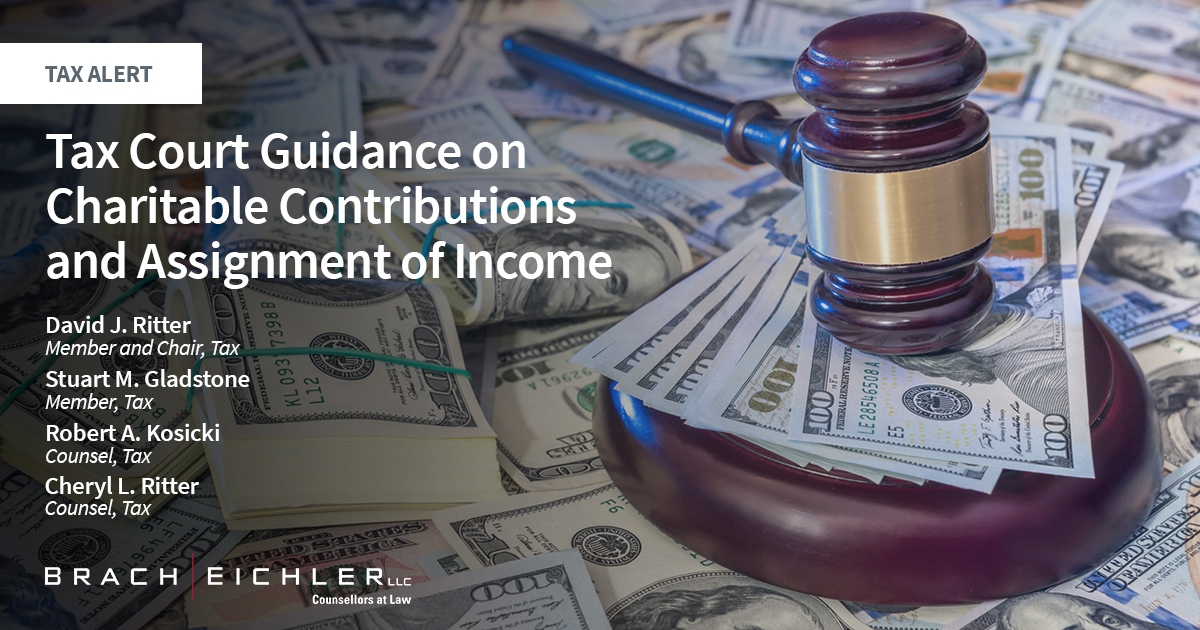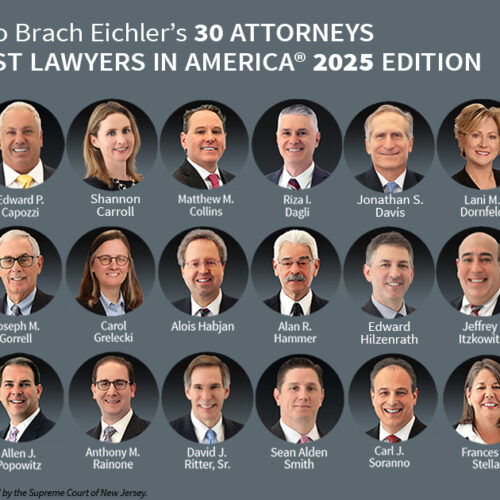973.228.5700 Terms of Use


Tax Alert | Tax Court Guidance on Charitable Contributions and Assignment of Income

February 26, 2024
Today is the first of two alerts dealing with the Estate of Hoensheid v. Commissioner of Internal Revenue, T.C. Memo 2023-34 (2023). In this, the first, the standard for determining whether a taxpayer has made an anticipatory assignment of income is discussed. The judicially created anticipatory assignment of income doctrine recognizes that income is taxed to those who earn or otherwise create the right to receive it and that it cannot be assigned or gifted away.
Hoensheid involves a common fact pattern. The taxpayer was one of three owners of a closely held business, wishing to both sell and to contribute part or all of the proceeds to a tax-exempt charity or donor advised fund, the assignee. If properly structured, the owner receives a charitable deduction equal to the fair market value of the contributed property and the built-in gain on the investment is taxed to the charity. In order to do so, the owner must contribute the ownership interest (in this case 1380 shares of stock) to the charity, but when? Like most owners, the taxpayer in Hoensheid wanted to wait as long as possible before making the actual contribution. During the course of the negotiations concerning the sale, the taxpayer was advised that the contribution had to be completed before any purchase agreement was executed. This is referred to the binding agreement test and has its origin in Rev. Rul. 78-197. If you contribute before the purchase agreement is signed, no anticipatory assignment. If you contribute after the purchase agreement is signed, anticipatory assignment. It provides a bright line for taxpayers. But is it that simple?
The Tax Court first analyzed the requirements under state law to determine when the gift was completed. It concluded the gift took place on July 13, 2015, two days before the signing of the SPA on July 15, 2015, seemingly within the bright line test of Rev. Rul. 78-197. The Tax Court agreed that the gift occurred before the sale and that the charity was not obligated to sell at the time of the gift, but that although the donee’s legal obligation to sell is significant to the assignment of income analysis, it was only one factor.
In short, there is no bright line but there are multiple factors in an assignment of income analysis of a fact pattern. Instead, the ultimate question is whether the transferor, considering the reality and substance of all the circumstances, had a fixed right to income in the property at the time of transfer. If the sale was virtually certain to occur, the anticipatory assignment of income doctrine is satisfied and the taxpayer, not the charity, is taxed on the sales proceeds from the charity’s sale.
In this case, the relevant factors in determining whether the sale of shares was virtually certain to occur include:
- Any legal obligation to sell by the donee.
- The actions already taken by the parties to effect the transaction.
- The remaining unresolved transactional contingencies.
- The status of the corporate formalities required to finalize the transactions.
With regard to the first factor, the Tax Court held that there was no proof of any obligation of the charity to sell the shares, either formal or informal. This was a favorable factor for the taxpayer.
With regard to the second factor, the Tax Court found that there were bonus and shareholder distributions made before the SPA was executed. This factor indicates that the income was earned at an earlier point in time.
With regard to the third factor, the Tax Court found that there were major transactional contingencies (environmental obligations) but that they had been resolved before the SPA was executed. This factor indicates that the income was earned at an earlier point in time.
With regard to the fourth factor, the Tax Court found that after the SPA was executed there were only ministerial actions remaining. This factor indicates that the income was earned at an earlier point in time.
The tax court, based on the various factors mentioned above, determined that the income or gain from the sale was earned at an earlier point in time, resulting in the taxpayer being treated as the seller of the shares of stock purportedly gifted to the charity.
In summary, as the Tax Court found, to avoid an anticipatory assignment of income on the contribution of appreciated shares of stock followed by a sale of the donee, a donor must bear at least some risk at the time of contribution that the sale will not close. The bright line of Rev. Rul. 78-187 was a factor but compliance with that alone did not provide a safe harbor. Other factors needed to be considered to determine if the gain was earned before the sale and taxable to the donor.
If you are the owner of a closely held business and are contemplating a charitable gift of a portion of your ownership interest, do not hesitate to contact either David Ritter, Stuart Gladstone, Bob Kosicki, or Cheryl Ritter for guidance in dealing with the multiple factors set forth in the anticipatory assignment of income doctrine.
For more information or assistance, please contact:
David J. Ritter, Esq. , Member and Chair, Tax Practice , at [email protected] or 973-403-3117
Stuart M. Gladstone, Esq. , Member, Tax Practice , at [email protected] or 973-403-3109
Robert A. Kosicki, Esq. , Counsel, Tax Practice , at [email protected] or 973-403-3122
Cheryl L. Ritter, Esq. , Counsel, Tax Practice , at [email protected] or 973-364-8307
About Brach Eichler LLC
Brach Eichler LLC is a full-service law firm based in Roseland, NJ. With over 80 attorneys, the firm is focused in the following practice areas: Healthcare Law; Real Estate; Litigation; Trusts and Estates; Corporate Transactions & Financial Services; Personal Injury; Criminal Defense and Government Investigations; Labor and Employment; Environmental and Land Use; Family Law Services; Patent, Intellectual Property & Information Technology; Real Estate Tax Appeals; Tax; and Cannabis Law. Brach Eichler attorneys have been recognized by clients and peers alike in The Best Lawyers in America©, Chambers USA, and New Jersey Super Lawyers. For more information, visit www.bracheichler.com .
This alert is intended for informational and discussion purposes only. The information contained in this alert is not intended to provide, and does not constitute legal advice or establish the attorney/client relationship by way of any information contained herein. Brach Eichler LLC does not guarantee the accuracy, completeness, usefulness or adequacy of any information contained herein. Readers are advised to consult with a qualified attorney concerning the specifics of a particular situation.

David J. Ritter
Member Tax, Corporate Transactions & Financial Services, Trusts and Estates
973.403.3117 · 973.618.5517 Fax

Stuart M. Gladstone
Member Trusts and Estates, Corporate Transactions & Financial Services, Tax
973.403.3109 · 973.618.5509 Fax

Robert A. Kosicki
Counsel Corporate Transactions & Financial Services, Family Law Services, Patent, Intellectual Property & IT, Tax, Trusts and Estates
973.403.3122 · 973.618.5522 Fax

Cheryl L. Ritter
Counsel Tax, Trusts and Estates
973.364.8307 · 973.618.5508 Fax
More Tax…

45 Total Brach Eichler Attorneys Recognized in the “2025 Best Lawyers in America©” List by Best Lawyers
August 15, 2024

2024 Chambers High Net Worth Guide Recognizes Brach Eichler Trusts and Estates Co-Chair Susan K. Dromsky-Reed for Private Wealth Law
July 30, 2024

Brach Eichler Celebrates Being Named to NJBIZ Best Places to Work 2024
June 28, 2024

Supreme Court Rules a Redemption Agreement Does Not Create an Offsetting Obligation for Valuation Purposes
June 7, 2024

WEBINAR | Noncompete Ban: What Every Estate Planner Must Know About the FTCs New Rule and Its Impact on Estate and Succession Planning
May 26, 2024

Firm Announcements & Wins
Brach eichler llc announces its executive committee.
April 1, 2024
Related Practices: Tax
Related Attorney: Cheryl L. Ritter , David J. Ritter , Stuart M. Gladstone , Robert A. Kosicki

- Professionals

Sitemap | Copyright © 2024 | Brach Eichler LLC | Terms of Use | Awards and Honors Methodology

- Privacy Overview
- Strictly Necessary Cookies
- 3rd Party Cookies
This site uses cookies to store information on your computer. Some of these cookies are essential, while others help us to improve your experience by providing insights into how the site is being used. Click Accept to continue using the site with recommended settings, or choose Cookie Settings make changes. Privacy Policy
Strictly Necessary Cookie should be enabled at all times so that we can save your preferences for cookie settings.
If you disable this cookie, we will not be able to save your preferences. This means that every time you visit this website you will need to enable or disable cookies again.
This website uses Google Analytics to collect anonymous information such as the number of visitors to the site, and the most popular pages.
Keeping this cookie enabled helps us to improve our website.
Please enable Strictly Necessary Cookies first so that we can save your preferences!

What is “Assignment of Income” Under the Tax Law?
Gross income is taxed to the individual who earns it or to owner of property that generates the income. Under the so-called “assignment of income doctrine,” a taxpayer may not avoid tax by assigning the right to income to another.
Specifically, the assignment of income doctrine holds that a taxpayer who earns income from services that the taxpayer performs or property that the taxpayer owns generally cannot avoid liability for tax on that income by assigning it to another person or entity. The doctrine is frequently applied to assignments to creditors, controlled entities, family trusts and charities.
A taxpayer cannot, for tax purposes, assign income that has already accrued from property the taxpayer owns. This aspect of the assignment of income doctrine is often applied to interest, dividends, rents, royalties, and trust income. And, under the same rationale, an assignment of an interest in a lottery ticket is effective only if it occurs before the ticket is ascertained to be a winning ticket.
However, a taxpayer can shift liability for capital gains on property not yet sold by making a bona fide gift of the underlying property. In that case, the donee of a gift of securities takes the “carryover” basis of the donor.
For example, shares now valued at $50 gifted to a donee in which the donor has a tax basis of $10, would yield a taxable gain to the donee of its eventual sale price less the $10 carryover basis. The donor escapes income tax on any of the appreciation.
For guidance on this issue, please contact our professionals at 315.242.1120 or [email protected] .
Share This Story, Choose Your Platform!
Privacy overview.
Necessary cookies are absolutely essential for the website to function properly. This category only includes cookies that ensures basic functionalities and security features of the website. These cookies do not store any personal information.
Any cookies that may not be particularly necessary for the website to function and is used specifically to collect user personal data via analytics, ads, other embedded contents are termed as non-necessary cookies. It is mandatory to procure user consent prior to running these cookies on your website.

Trending News

Related Practices & Jurisdictions
- Corporate Business Organizations
- Litigation Trial Practice
- All Federal

A recent taxpayer victory in the Tax Court in the case of Jon Dickinson, et ux. v. Commissioner, TC Memo 2020‑128 (Sept. 3, 2020), is an important reminder to donors and potential charitable donees to be well informed of the law when donating, or soliciting donations of, appreciated closely held business interests.
Benefits of Donating Appreciated Interests Ahead of Sales
Wise taxpayers, frequently on the advice of their knowledgeable tax advisors, know that when making a charitable gift, it is typically most beneficial to make a donation to a public charity of an appreciated asset in order to obtain a charitable deduction, rather than donating cash, or even worse, the after-tax proceeds of the sale of the appreciated asset. The benefits, of course, are that the taxpayer will both receive a tax deduction equal to the fair market value of the asset and will not incur tax (i.e., capital gains) on the transaction. This benefit is illustrated in the below example:
| Option 1: Sell stock and donate the net proceeds | Option 2: Donate stock directly to the charity | |
| FMV of stock ($5,000 basis) | $100,000 | $100,000 |
| Federal LTCG tax (15%) | $14,250 | $0 |
| Amount donated to charity | $85,750 | $100,000 |
| Potential personal income tax savings | $27,440 | $32,000 |
Donating appreciated business interests in situations where the business may be sold, or the business owner may otherwise be preparing to divest herself or himself of part of their ownership interest, may be particularly appealing to a philanthropic business owner. As the example illustrates, pre-transaction planning can maximize the amount ultimately available for philanthropic endeavors at the lowest cost to the donor. Savvy gift officers and charities will often suggest this strategy to donors as a way for both the donor and the charity to “win.”
Assignment of Income Doctrine
Donors should be cautious about making a gift of an interest in anticipation of a sale or other liquidation event for a variety of reasons. For example, if the expected transaction does not occur, it may not be advisable for the charity to own an interest in the company (and the company may not be too happy about it either). Under those circumstances a charity is not permitted to “re-gift” the interest back to the donor. In even the best of situations, reversing such a transaction would be become complex, and in fact, in most cases it is usually not possible.
Because of the risk associated with a deal not closing, donors often seek to wait until there is some certainty that a transaction will in fact close. However, the longer a donor waits, the greater the risk that the intended result – a donation of property subject to an unrealized gain (i.e., untaxed) – will not be achieved because of the assignment of income doctrine.
The assignment of income doctrine is one of a handful of judicial doctrines developed by United States courts to try to limit tax evasion. A key principal is that a donor cannot avoid taxation on property by merely making a gift of the property. If the substance of the transaction is to avoid income that is otherwise already subject to taxation, such gift may be disregarded. 1 This boils down to a facts-and-circumstances timing question.
Generally, the assignment of income doctrine provides that gain is realized by the owner of property when all events have occurred such that the final resulting transaction is all but assured. In reality, the interest has “ripened” into a fixed right to receive income. 2 Said yet another way, the question is often whether subsequent to the gift there are independent event(s) of significance to conclude that all substantive events related to the transaction have not yet occurred. The charity receiving the donation cannot simply function as a conduit for a transaction that has progressed to the point where it is almost certainly taking place. Whether a particular transaction or series of transactions have, when considering the reality and substance of the circumstances, proceeded to such a point is a fact-specific determination.
The Tax Court Emphasizes Form of Gift of Appreciated Stock
In the Dickinson case decided earlier this month, Mr. Dickinson had acquired shares over time in a large privately held engineering and consulting firm. He, along with other shareholders, were authorized by the company’s Board of Directors to donate shares to Fidelity Investments Charitable Gift Fund, the donor advised fund, in the years 2013 and 2014. Fidelity Charitable’s policy, known to the firm and its shareholders, was to immediately liquidate donated stock and it did so with Mr. Dickinson’s donated shares by selling them back to the company.
On audit, the IRS determined that Mr. Dickinson did not donate appreciated stock, rather he donated cash because, in substance, the company first redeemed the shares and he then donated the cash to fund a donor advised fund account at Fidelity Charitable. The Tax Court rejected that characterization, however, choosing instead to focus on the form of the transaction, namely that (1) Mr. Dickinson fully transferred his rights to and legal control of the shares to Fidelity Charitable, and (2) he did so before the shares gave rise to income by way of a sale or redemption. Preexisting knowledge of Fidelity Charitable’s policy to immediately dispose of donated stock did not, in and of itself, convert the donation of stock into a pre-donation redemption; Fidelity Charitable received the stock and it had the right to do with it what it pleased. At the time of the donation, it could not have been definitively said that a redemption of the shares, regardless of who the owner was, would have occurred.
While the IRS attempted to base its conclusion on the theory that there was a pre-arranged plan for the redemption of the stock, the Tax Court rejected that argument. The Court found that even if that was the case, that does not mean that had the donor retained the stock it would similarly have been redeemed. Citing its 1974 Palmer decision, the Tax Court stated, “[t]he ultimate question, as noted in Palmer, is whether the redemption and the shareholder’s corresponding right to income had already crystallized at the time of the gift.” 3
Planning Pointers for Donors and Charities
The Dickinson case is a good reminder that the IRS will seek to challenge gifts of appreciated business interests. With such an emphasis by the Tax Court on the proper form of such gifts, donors should be mindful to make the donation sufficiently before the time when the “all events” test has been met, especially in the case of a proposed or impending transaction, or before “the shareholder’s corresponding right to income…[has] already crystallized.” While the taxpayer succeeded in the Dickinson case, the facts-and-circumstances nature of the assignment of income doctrine can make decision-making tricky when donors hope to make donations of appreciated interests in advance of transactions. Taxpayers should seek legal counsel in such cases.
Charities should also take heed. While many charities have wisely begun to focus on soliciting non-cash charitable gifts, such as appreciated stock, charities should become familiar with the legal principles, such as the assignment of income doctrine, which can impact these gifts. Charities should consider their policies and practices with respect to soliciting and accepting such gifts, both in form and in practice. Not all donors will be fully aware of these principles and may be sorely surprised after making a gift if audited. It may behoove a charity to help educate donors so that a gift is successfully completed. Unhappy donors are not typically repeat donors.
1 See Palmer v. Commissioner, 62 T.C. 684, 692 (1974), affd. on other grounds 523 F.2d 1308 [36 AFTR 2d 75-5942] (8th Cir. 1975), acq. 1978-1 CB 2.
2 See Ferguson v. Commissioner, 174 F.3d 997 (9th Cir. 1999).
3 See Palmer v. Commissioner, 62 T.C. at 694-695
Christina Cahill, Nicole Riberio & Erica Seaborne also contributed to this article.
Current Public Notices
Current legal analysis, more from polsinelli pc, upcoming legal education events.
Sign Up for e-NewsBulletins
Access Leading Tax Experts And Technology In Our Global Digital Marketplace
Please select an option from dropdown.
Please enter your input in search field.
We Are Proven Connectors Worldwide >>> Ask Our Executive Search Services Division
Anticipatory assignment of income, charitable contribution deduction, and qualified appraisals.

Estate of Hoenshied v. Comm’r, T.C. Memo. 2023-34 | March 15, 2023 | Nega, J. | Dkt. No. 18606-19
Summary: In this 49-page opinion the Tax Court addresses a deficiency arising from the charitable contribution of appreciated shares of stock in a closely held corporation to a charitable organization that administers donor-advised funds for tax-exempt purposes under section 501(c)(3). The contribution in issue was made near contemporaneously with the selling of those shares to a third party. The timeline (truncated heavily for this blog) is as follows:
On June 11, 2015, the shareholders of the corporation in issue unanimously ratified the sale of all outstanding stock of the corporation. Immediately following the shareholder meeting, the corporation’s board of directors unanimously approved Petitioner’s request to be able to transfer a portion of his shares to Fidelity Charitable Gift Fund, a tax-exempt charitable organization under section 501(c)(3). Thereafter, the corporation and the purchaser of shares continued drafting and revising the Contribution and Stock Purchase Agreement.
On July 13, 2015, Fidelity Charitable first received a stock certificate from Petitioner.
On July 14, 2015, the Contribution and Stock Purchase Agreement was revised to specify that Petitioner contributed shares to Fidelity Charitable on July 10, 2015, and on July 15, 2015, the Contribution and Stock Purchase Agreement was signed and the transaction was funded.
Fidelity Charitable, having provided an Irrevocable Stock Power as part of the transaction, received $2,941,966 in cash proceeds from the sale, which was deposited in Petitioner’s donor-advised fund giving account.
On November 18, 2015, Fidelity Charitable sent Petitioner a contribution confirmation letter acknowledging a charitable contribution of the corporate shares and indicating that Fidelity Charitable received the shares on June 11, 2015.
In its 2015 tax return, Petitioner did not report any capital gains on the shares contributed to Fidelity Charitable but claimed a noncash charitable contribution deduction of $3,282,511. In support of the claimed deduction, a Form 8283 was attached to the return.
Petitioner’s 2015 tax return was selected for examination. The IRS issued to Petitioners a notice of deficiency, determining a deficiency of $647,489, resulting from the disallowance of the claimed charitable contribution deduction, and a penalty of $129,498 under section 6662(a).
Key Issues:
Whether and when Petitioners made a valid contribution of the shares of stock? Whether Petitioners had unreported capital gain income due to their right to proceeds from the sale of those shares becoming fixed before the gift? Whether Petitioners are entitled to a charitable contribution deduction? Whether Petitioners are liable for an accuracy-related penalty under section 6662(a) with respect to an underpayment of tax?
Primary Holdings:
(1) Petitioners failed to establish that any of the elements of a valid gift was present on June 11, 2015. No evidence was presented to credibly identify a specific action taken on June 11 that placed the shares within Fidelity Charitable’s dominion and control. Instead, the valid gift of shares was made by effecting delivery of a PDF of the certificate to Fidelity Charitable on July 13.
(2) Yes. None of the unresolved contingencies remaining on July 13, 2015 were substantial enough to have posed even a small risk of the overall transaction’s failing to close. Thus, Petitioners, through the doctrine of anticipatory assignment of income, had capital gains on the sale of the 1,380 appreciated shares of stock, even though Fidelity Charitable received the proceeds from that sale.
(3) No, Petitioners failed to show that the charitable contribution met the qualified appraisal requirements of section 170. The appraiser was not shown to be qualified, per regulations, at trial or in the appraisal itself, and the appraisal did not substantially comply with the regulatory requirements. “The failure to include a description of such experience in the appraisal was a substantive defect. . . . Petitioners’ failure to satisfy multiple substantive requirements of the regulations, paired with the appraisal’s other more minor defects, precludes them from establishing substantial compliance.” In addition, Petitioners failed to establish reasonable cause for failing to comply with the appraisal requirements “because petitioner knew or should have known that the date of contribution (and thus the date of valuation) was incorrect.” Thus, the IRS’s determination to disallow the charitable contribution deduction is sustained.
(4) No. While Petitioners did not have reasonable cause for their failure to comply with the qualified appraisal requirement, their liability for an accuracy-related penalty was a separate analysis, and the IRS did not carry the burden of proof. Petitioners did not follow their professional’s advice to have the paperwork for the contribution ready to go “well before the signing of the definitive purchase agreement.” But, Petitioners adhered to the literal thrust of the advice given: that “execution of the definitive purchase agreement” was the firm deadline to contribute the shares and avoid capital gains (even if that proved to be incorrect advice under the circumstances).
Key Points of Law:
Gross Income. Gross income means “all income from whatever source derived,” including “[g]ains derived from dealings in property.” 26 U.S.C. § 61(a)(3). In general, a taxpayer must realize and recognize gains on a sale or other disposition of appreciated property. See id. at § 1001(a)–(c). However, a taxpayer typically does not recognize gain when disposing of appreciated property via gift or charitable contribution. See Taft v. Bowers, 278 U.S. 470, 482 (1929); see also 26 U.S.C. § 1015(a) (providing for carryover basis of gifts). A taxpayer may also generally deduct the fair market value of property contributed to a qualified charitable organization. See 26 U.S.C. § 170(a)(1); Treas. Reg. 16 § 1.170A-1(c)(1). Contributions of appreciated property are thus tax advantaged compared to cash contributions; when a contribution of property is structured properly, a taxpayer can both avoid paying tax on the unrealized appreciation in the property and deduct the property’s fair market value. See, e.g., Dickinson v. Commissioner, T.C. Memo. 2020-128, at *5.
Donor-Advised Fund. The use of a donor-advised fund further optimizes a contribution by allowing a donor “to get an immediate tax deduction but defer the actual donation of the funds to individual charities until later.” Fairbairn v. Fid. Invs. Charitable Gift Fund, No. 18-cv-04881, 2021 WL 754534, at *2 (N.D. Cal. Feb. 26, 2021).
Two-Part Test to Determine Charitable Contribution of Appreciated Property Followed by Sale by Donee. The donor must (1) give the appreciated property away absolutely and divest of title (2) “before the property gives rise to income by way of a sale.” Humacid Co. v. Commissioner, 42 T.C. 894, 913 (1964). Valid Gift of Shares of Stock. “Ordinarily, a contribution is made at the time delivery is effected.” Treas. Reg. § 1.170A-1(b). “If a taxpayer unconditionally delivers or mails a properly endorsed stock certificate to a charitable donee or the donee’s agent, the gift is completed on the date of delivery.” Id. However, the regulations do not define what constitutes delivery, and the Tax Court evaluates applicable state law for the threshold determination of whether donors have divested themselves of their property rights via gift. See, e.g., United States v. Nat’l Bank of Com., 472 U.S. 713, 722 (1985). In determining the validity of a gift, Michigan law, for example (and as applied in Estate of Hoensheid), requires a showing of (1) donor intent to make a gift; (2) actual or constructive delivery of the subject matter of the gift; and (3) donee acceptance. See Davidson v. Bugbee, 575 N.W.2d 574, 576 (Mich. Ct. App. 1997).
Present Intent. The determination of a party’s subjective intent is necessarily a highly fact-bound issue. When deciding such an issue, the Tax Court must determine “whether a witness’s testimony is credible based on objective facts, the reasonableness of the testimony, the consistency of statements made by the witness, and the demeanor of the witness.” Ebert v. Commissioner, T.C. Memo. 2015-5, at *5–6. If contradicted by the objective facts in the record, the Tax Court will not “accept the self-serving testimony of [the taxpayer] . . . as gospel.” Tokarski v. Commissioner, 87 T.C. 74, 77 (1986).
Delivery. Under Michigan law, the delivery requirement generally contemplates an “open and visible change of possession” of the donated property. Shepard v. Shepard, 129 N.W. 201, 208 (Mich. 1910). Manually providing tangible property to the donee is the classic form of delivery. Manually providing to the donee a stock certificate that represents intangible shares of stock is traditionally sufficient delivery. The determination of what constitutes delivery is context-specific and depends upon the “nature of the subject-matter of the gift” and the “situation and circumstances of the parties.” Shepard, 129 N.W. at 208. Constructive delivery may be effected where property is delivered into the possession of another on behalf of the donee. See, e.g., In re Van Wormer’s Estate, 238 N.W. 210, 212 (Mich. 1931). Whether constructive or actual, delivery “must be unconditional and must place the property within the dominion and control of the donee” and “beyond the power of recall by the donor.” In re Casey Estate, 856 N.W.2d 556, 563 (Mich. Ct. App. 2014). If constructive or actual delivery of the gift property occurs, its later retention by the donor is not sufficient to defeat the gift. See Estate of Morris v. Morris, No. 336304, 2018 WL 2024582, at *5 (Mich. Ct. App. May 1, 2018).
Delivery of Shares. Retention of stock certificates by donor’s attorney may preclude a valid gift. Also, a determination of no valid gift may occur where the taxpayer instructs a custodian of corporate books to prepare stock certificates but remained undecided about ultimate gift. In some jurisdictions, transfer of shares on the books of the corporation can, in certain circumstances, constitute delivery of an inter vivos gift of shares. See, e.g., Wilmington Tr. Co. v. Gen. Motors Corp., 51 A.2d 584, 594 (Del. Ch. 1947); Chi. Title & Tr. Co. v. Ward, 163 N.E. 319, 322 (Ill. 1928); Brewster v. Brewster, 114 A.2d 53, 57 (Md. 1955). The U.S. Court of Appeals for the Sixth Circuit has stated that transfer on the books of a corporation constitutes delivery of shares of stock, apparently as a matter of federal common law. See Lawton v. Commissioner, 164 F.2d 380, 384 (6th Cir. 1947), rev’g 6 T.C. 1093 (1946); Bardach v. Commissioner, 90 F.2d 323, 326 (6th Cir. 1937), rev’g 32 B.T.A. 517 (1935); Marshall v. Commissioner, 57 F.2d 633, 634 (6th Cir. 1932), aff’g in part, rev’g in part 19 B.T.A. 1260 (1930). The transfers on the books of the corporation were bolstered by other objective actions that evidenced a change in possession and thus a gift. See Jolly’s Motor Livery Co. v. Commissioner, T.C. Memo. 1957-231, 16 T.C.M. (CCH) 1048, 1073.
Acceptance. Donee acceptance of a gift is generally “presumed if the gift is beneficial to the donee.” Davidson, 575 N.W.2d at 576.
Anticipatory Assignment of Income. The anticipatory assignment of income doctrine is a longstanding “first principle of income taxation.” Commissioner v. Banks, 543 U.S. 426, 434 (2005). The doctrine recognizes that income is taxed “to those who earn or otherwise create the right to receive it,” Helvering v. Horst, 311 U.S. 112, 119 (1940), and that tax cannot be avoided “by anticipatory arrangements and contracts however skillfully devised,” Lucas v. Earl, 281 U.S. 111, 115 (1930). A person with a fixed right to receive income from property thus cannot avoid taxation by arranging for another to gratuitously take title before the income is received. See Helvering, 311 U.S. at 115–17; Ferguson, 108 T.C. at 259. This principle is applicable, for instance, where a taxpayer gratuitously assigns wage income that the taxpayer has earned but not yet received, or gratuitously transfers a debt instrument carrying accrued but unpaid interest. A donor will be deemed to have effectively realized income and then assigned that income to another when the donor has an already fixed or vested right to the unpaid income. See Cold Metal Process Co. v. Commissioner, 247 F.2d 864, 872–73 (6th Cir. 1957), rev’g 25 T.C. 1333 (1956). The same principle is often applicable where a taxpayer gratuitously transfers shares of stock that are subject to a pending, prenegotiated transaction and thus carry a fixed right to proceeds of the transaction. See Rollins v. United States, 302 F. Supp. 812, 817–18 (W.D. Tex. 1969).
Determining Anticipatory Assignment of Income. In determining whether an anticipatory assignment of income has occurred with respect to a gift of shares of stock, the Tax Court looks to the realities and substance of the underlying transaction, rather than to formalities or hypothetical possibilities. See Jones v. United States, 531 F.2d 1343, 1345 (6th Cir. 1976) (en banc); Allen v. Commissioner, 66 T.C. 340, 346 (1976). In general, a donor’s right to income from shares of stock is fixed if a transaction involving those shares has become “practically certain to occur” by the time of the gift, “despite the remote and hypothetical possibility of abandonment.” Jones, 531 F.2d at 1346. The mere anticipation or expectation of income at the time of the gift does not establish that a donor’s right to income is fixed. The Tax Court looks to several other factors that bear upon whether the sale of shares was virtually certain to occur at the time of a purported gift as part of the same transaction. Relevant factors may include (1) any legal obligation to sell by the donee, (2) the actions already taken by the parties to effect the transaction, (3) the remaining unresolved transactional contingencies, and (4) the status of the corporate formalities required to finalize the transaction.
Corporate Formalities. Also relevant is the status of the corporate formalities necessary for effecting the transaction. See Estate of Applestein, 80 T.C. at 345–46 (finding that taxpayer’s right to sale proceeds from shares had “virtually ripened” upon shareholders’ approval of proposed merger agreement). Under Michigan law, a proposed plan to exchange shares must generally be approved by a majority of the corporation’s shareholders. Formal shareholder approval of a transaction has often proven to be sufficient to demonstrate that a right to income from shares was fixed before a subsequent transfer. However, such approval is not necessary for a right to income to be fixed, when other actions taken establish that a transaction was virtually certain to occur. See Ferguson, 104 T.C. at 262–63. Charitable Contribution Deduction. Section 170(a)(1) allows as a deduction any charitable contribution (as defined) payment of which is made within the taxable year. “A charitable contribution is a gift of property to a charitable organization made with charitable intent and without the receipt or expectation of receipt of adequate consideration.” Palmolive Bldg. Invs., LLC v. Commissioner, 149 T.C. 380, 389 (2017). Section 170(f)(8)(A) provides that “[n]o deduction shall be allowed . . . for any contribution of $250 or more unless the taxpayer substantiates the contribution by a contemporaneous written acknowledgement of the contribution by the donee organization that meets the requirements of subparagraph (B).” For contributions of property in excess of $500,000, the taxpayer must also attach to the return a “qualified appraisal” prepared in accordance with generally accepted appraisal standards. 26 U.S.C. § 170(f)(11)(D) and (E). Contemporaneous Written Acknowledgement (“CWA”). A CWA must include, among other things, the amount of cash and a description of any property contributed. 26 U.S.C. § 170(f)(8)(B). A CWA is contemporaneous if obtained by the taxpayer before the earlier of either (1) the date the relevant tax return was filed or (2) the due date of the relevant tax return. Id. at § 170(f)(8)(C). For donor-advised funds, the CWA must include a statement that the donee “has exclusive legal control over the assets contributed.” 26 U.S.C. § 170(f)(18)(B). These requirements are construed strictly and do not apply the doctrine of substantial compliance to excuse defects in a CWA.
Qualified Appraisal for Certain Charitable Contributions. Section 170(f)(11)(A)(i) provides that “no deduction shall be allowed . . . for any contribution of property for which a deduction of more than $500 is claimed unless such person meets the requirements of subparagraphs (B), (C), and (D), as the case may be.” Subparagraph (D) requires that, for contributions for which a deduction in excess of $500,000 is claimed, the taxpayer attach a qualified appraisal to the return. Section 170(f)(11)(E)(i) provides that a qualified appraisal means, with respect to any property, an appraisal of such property which—(I) is treated for purposes of this paragraph as a qualified appraisal under regulations or other guidance prescribed by the Secretary, and (II) is conducted by a qualified appraiser in accordance with generally accepted appraisal standards and any regulations or other guidance prescribed under subclause (I). The regulations provide that a qualified appraisal is an appraisal document that, inter alia, (1) “[r]elates to an appraisal that is made” no earlier than 60 days before the date of contribution and (2) is “prepared, signed, and dated by a qualified appraiser.” Treas. Reg. § 1.170A-13(c)(3)(i).
Qualified Appraisal Must Include: Treasury Regulation § 1.170A-13(c)(3)(ii) requires that a qualified appraisal itself include, inter alia:
(1) “[a] description of the property in sufficient detail for a person who is not generally familiar with the type of property to ascertain that the property that was appraised is the property that was (or will be) contributed;”
(2) “[t]he date (or expected date) of contribution to the donee;”
(3) “[t]he name, address, and . . . identifying number of the qualified appraiser;”
(4) “[t]he qualifications of the qualified appraiser;”
(5) “a statement that the appraisal was prepared for income tax purposes;”
(6) “[t]he date (or dates) on which the property was appraised;”
(7) “[t]he appraised fair market value . . . of the property on the date (or expected date) of contribution;” and
(8) the method of and specific basis for the valuation.
Qualified Appraiser. Section 170(f)(11)(E)(ii) provides that a “qualified appraiser” is an individual who (I) has earned an appraisal designation from a recognized professional appraiser organization or has otherwise met minimum education and experience requirements set forth in regulations, (II) regularly performs appraisals for which the individual receives compensation, and (III) meets such other requirements as may be prescribed . . . in regulations or other guidance. An appraiser must also demonstrate “verifiable education and experience in valuing the type of property subject to the appraisal.” The regulations add that the appraiser must include in the appraisal summary a declaration that he or she (1) “either holds himself or herself out to the public as an appraiser or performs appraisals on a regular basis;” (2) is “qualified to make appraisals of the type of property being valued;” (3) is not an excluded person specified in paragraph (c)(5)(iv) of the regulation; and (4) understands the consequences of a “false or fraudulent overstatement” of the property’s value. Treas. Reg. § 1.170A-13(c)(5)(i). The regulations prohibit a fee arrangement for a qualified appraisal “based, in effect, on a percentage . . . of the appraised value of the property.” Id. at subpara. (6)(i).
Substantial Compliance with Qualified Appraisal Requirements . The qualified appraisal requirements are directory, rather than mandatory, as the requirements “do not relate to the substance or essence of whether or not a charitable contribution was actually made.” See Bond v. Commissioner, 100 T.C. 32, 41 (1993). Thus, the doctrine of substantial compliance may excuse a failure to strictly comply with the qualified appraisal requirements. If the appraisal discloses sufficient information for the IRS to evaluate the reliability and accuracy of a valuation, the Tax Court may deem the requirements satisfied. Bond, 100 T.C. at 41–42. Substantial compliance allows for minor or technical defects but does not excuse taxpayers from the requirement to disclose information that goes to the “essential requirements of the governing statute.” Estate of Evenchik v. Commissioner, T.C. Memo. 2013-34, at *12. The Tax Court generally declines to apply substantial compliance where a taxpayer’s appraisal either (1) fails to meet substantive requirements in the regulations or (2) omits entire categories of required information.
Reasonable Cause to Avoid Denial of Charitable Contribution Deduction. Taxpayers who fail to comply with the qualified appraisal requirements may still be entitled to charitable contribution deductions if they show that their noncompliance is “due to reasonable cause and not to willful neglect.” 26 U.S.C. § 170(f)(11)(A)(ii)(II). This defense is construed similarly to the defense applicable to numerous other Code provisions that prescribe penalties and additions to tax. See id. at § 6664(c)(1). To show reasonable cause due to reliance on a professional adviser, the Tax Court generally requires that a taxpayer show (1) that their adviser was a competent professional with sufficient expertise to justify reliance; (2) that the taxpayer provided the adviser necessary and accurate information; and (3) that the taxpayer actually relied in good faith on the adviser’s judgment. See Neonatology Assocs., P.A. v. Commissioner, 115 T.C. 43, 99 (2000), aff’d, 299 F.3d 221 (3d Cir. 2002). “Unconditional reliance on a tax return preparer or C.P.A. does not by itself constitute reasonable reliance in good faith; taxpayers must also exercise ‘[d]iligence and prudence’.” See Stough v. Commissioner, 144 T.C. 306, 323 (2015) (quoting Estate of Stiel v. Commissioner, T.C. Memo. 2009-278, 2009 WL 4877742, at *2)).
Section 6662(a) Penalty. Section 6662(a) and (b)(1) and (2) imposes a 20% penalty on any underpayment of tax required to be show on a return that is attributable to negligence, disregard of rules or regulations, or a substantial understatement of income tax. Negligence includes “any failure to make a reasonable attempt to comply” with the Code, 26 U.S.C. § 6662(c), or a failure “to keep adequate books and records or to substantiate items properly,” Treas. Reg. § 1.6662-3(b)(1). An understatement of income tax is “substantial” if it exceeds the greater of 10% of the tax required to be shown on the return or $5,000. 26 U.S.C. § 6662(d)(1)(A). Generally, the IRS bears the initial burden of production of establishing via sufficient evidence that a taxpayer is liable for penalties and additions to tax; once this burden is met, the taxpayer must carry the burden of proof with regard to defenses such as reasonable cause. Id. at § 7491(c); see Higbee v. Commissioner, 116 T.C. 438, 446–47 (2001). The IRS bears the burden of proof with respect to a new penalty or increase in the amount of a penalty asserted in his answer. See Rader v. Commissioner, 143 T.C. 376, 389 (2014); Rule 142(a), aff’d in part, appeal dismissed in part, 616 F. App’x 391 (10th Cir. 2015); see also RERI Holdings I, LLC v. Commissioner, 149 T.C. 1, 38–39 (2017), aff’d sub nom. Blau v. Commissioner, 924 F.3d 1261 (D.C. Cir. 2019). As part of the burden of production, the IRS must satisfy section 6751(b) by producing evidence of written approval of the penalty by an immediate supervisor, made before formal communication of the penalty to the taxpayer.
Reasonable Cause Defense to Section 6662(a) Penalty. A section 6662 penalty will not be imposed for any portion of an underpayment if the taxpayers show that (1) they had reasonable cause and (2) acted in good faith with respect to that underpayment. 26 U.S.C. § 6664(c)(1). A taxpayer’s mere reliance “on an information return or on the advice of a professional tax adviser or an appraiser does not necessarily demonstrate reasonable cause and good faith.” Treas. Reg. § 1.6664-4(b)(1). That reliance must be reasonable, and the taxpayer must act in good faith. In evaluating whether reliance is reasonable, a taxpayer’s “education, sophistication and business experience will be relevant.” Id. para. (c)(1).
Insights: Going forward, this opinion of Estate of Hoenshied v. Commissioner will likely be a go-to source for any practitioner involved in a taxpayer’s proposed transfer of corporate shares (or other property) to a donor-advised fund or other charitable organization as part of a buy-sell transaction that is anywhere close in time to the proposed donation.
Have a question? Contact Jason Freeman , Managing Member Legal Team.

Mr. Freeman is the founding and managing member of Freeman Law, PLLC. He is a dual-credentialed attorney-CPA, author, law professor, and trial attorney. Mr. Freeman has been recognized multiple times by D Magazine, a D Magazine Partner service, as one of the Best Lawyers in Dallas, and as a Super Lawyer by Super Lawyers, a Thomson Reuters service. He was honored by the American Bar Association, receiving its “On the Rise – Top 40 Young Lawyers” in America award, and recognized as a Top 100 Up-And-Coming Attorney in Texas. He was also named the “Leading Tax Controversy Litigation Attorney of the Year” for the State of Texas” by AI.
Subscribe to TaxConnections Blog
Enter your email address to subscribe to this blog and receive notifications of new posts by email.

Current Articles

Blogger List
Recent comments.
- James McKnight on New California State Exercising Right To Become The 51st State
- TaxConnections Admin on TIGTA: IRS Employees Willful Non-Compliance Paying Taxes
- TaxConnections Admin on Register Today For Tax Forum On Partnership Tax Law: Impact of The Chevron Deference
- George Prytula, III on Register Today For Tax Forum On Partnership Tax Law: Impact of The Chevron Deference
- David Myth on Tax Home: IRS Definition And Implications
Tax Blog Archives
NEVER MISS AN ISSUE OF TAXCONNECTION
Learn from tax advisors, straight to your inbox
KEEP ME INFORMED
INCREASE KNOWLEDGE WITH EVERY ISSUE OF TAXCONNECTIONS
KPMG Personalization
- U.S. Tax Court: Charitable deduction denied, donor must realize capital gains shares sold by donee
The court did relieve the taxpayers of understatement penalties under section 6662.
Donor of shares subsequently sold by donee must realize capital gains on shares
- Home ›
- Insights ›
The U.S. Tax Court on March 15, 2023, released a memorandum opinion holding that the taxpayers were not entitled to a charitable contribution deduction with respect to a donation of shares in a family business because they failed to obtain a qualified appraisal for the shares. In addition, the court held that when the donee subsequently sold the shares, the taxpayers realized and recognized capital gain with respect to the donated shares as a result of application of the assignment of income doctrine because their right to the proceeds of the already negotiated sale of the business were fixed before the gift of the shares was made.
The court did, however, relieve the taxpayers of accuracy-related underpayment penalties under section 6662 due to reasonable reliance on their tax advisor’s incorrect advice.
The case is: Estate of Hoensheid v. Commissioner, T.C. Memo 2023-24 (March 15, 2023). Read the Tax Court’s opinion [PDF 398 KB]
The taxpayer and his two brothers were equal owners in a long-held family business. One of the brothers wanted to retire, so the brothers decided to sell the business.
The taxpayer and his wife decided to donate a portion of the taxpayer’s shares to charity prior to the sale and were advised by their tax advisor that the charitable gift of the shares would have to occur before a definitive agreement to sell the business was in place.
The couple delayed the donation until two days before the business sale closed, allegedly out of concern that if the business sale did not go through, the taxpayer’s brothers would own more stock in the family business than he did.
The Tax Court found that because the taxpayers’ charitable gift of the shares occurred at a time when the sale of the shares was a virtual certainty, the taxpayers must realize capital gains on the sale of the shares. Moreover, because the taxpayers failed to provide a qualified appraisal for the shares at the time of the gift, they were not entitled to a charitable contribution deduction.
For more information, contact a tax professional with KPMG’s Washington National Tax practice:
Ruth Madrigal | [email protected]
Preston Quesenberry | [email protected]
The KPMG name and logo are trademarks used under license by the independent member firms of the KPMG global organization. KPMG International Limited is a private English company limited by guarantee and does not provide services to clients. No member firm has any authority to obligate or bind KPMG International or any other member firm vis-à-vis third parties, nor does KPMG International have any such authority to obligate or bind any member firm. The information contained herein is of a general nature and is not intended to address the circumstances of any particular individual or entity. Although we endeavor to provide accurate and timely information, there can be no guarantee that such information is accurate as of the date it is received or that it will continue to be accurate in the future. No one should act on such information without appropriate professional advice after a thorough examination of the particular situation. For more information, contact KPMG's Federal Tax Legislative and Regulatory Services Group at: + 1 202 533 3712, 1801 K Street NW, Washington, DC 20006.

COMMENTS
Taxpayer timely petitioned the U.S. Tax Court for redetermination, and asked for summary judgement on the IRS’s application of the assignment of income doctrine to their donation of Target stock to Charity.
The judicially created anticipatory assignment of income doctrine recognizes that income is taxed to those who earn or otherwise create the right to receive it and that it cannot be assigned or gifted away. Hoensheid involves a common fact pattern.
More broadly, the anticipatory assignment of income doctrine prevents taxpayers from gratuitously assigning property ripe with income to a third party (usually a charity or relative) with a purpose of having the assignee taxed on the income inherent in the property.
Gross income is taxed to the individual who earns it or to owner of property that generates the income. Under the so-called “assignment of income doctrine,” a taxpayer may not avoid tax by assigning the right to income to another.
Generally, the assignment of income doctrine provides that gain is realized by the owner of property when all events have occurred such that the final resulting transaction is all but...
Assignment of Income Doctrine. What is it? A judicial doctrine that income should be taxed at the source that generated it and cannot be anticipatorily signed to a third party.
The assignment of income doctrine is a judicial doctrine developed in United States case law by courts trying to limit tax evasion. The assignment of income doctrine seeks to "preserve the progressive rate structure of the Code by prohibiting the splitting of income among taxable entities." [1]
The doctrine recognizes that income is taxed “to those who earn or otherwise create the right to receive it,” Helvering v. Horst, 311 U.S. 112, 119 (1940), and that tax cannot be avoided “by anticipatory arrangements and contracts however skillfully devised,” Lucas v.
The U.S. Tax Court on March 15, 2023, released a memorandum opinion holding that the taxpayers were not entitled to a charitable contribution deduction with respect to a donation of shares in a family business because they failed to obtain a qualified appraisal for the shares.
Assignment of Income In general, under the anticipatory assignment of income doctrine, a taxpayer who earns or otherwise creates a right to receive income will be taxed on any gain realized from it, if the taxpayer has the right to receive the income or if, based on the realities